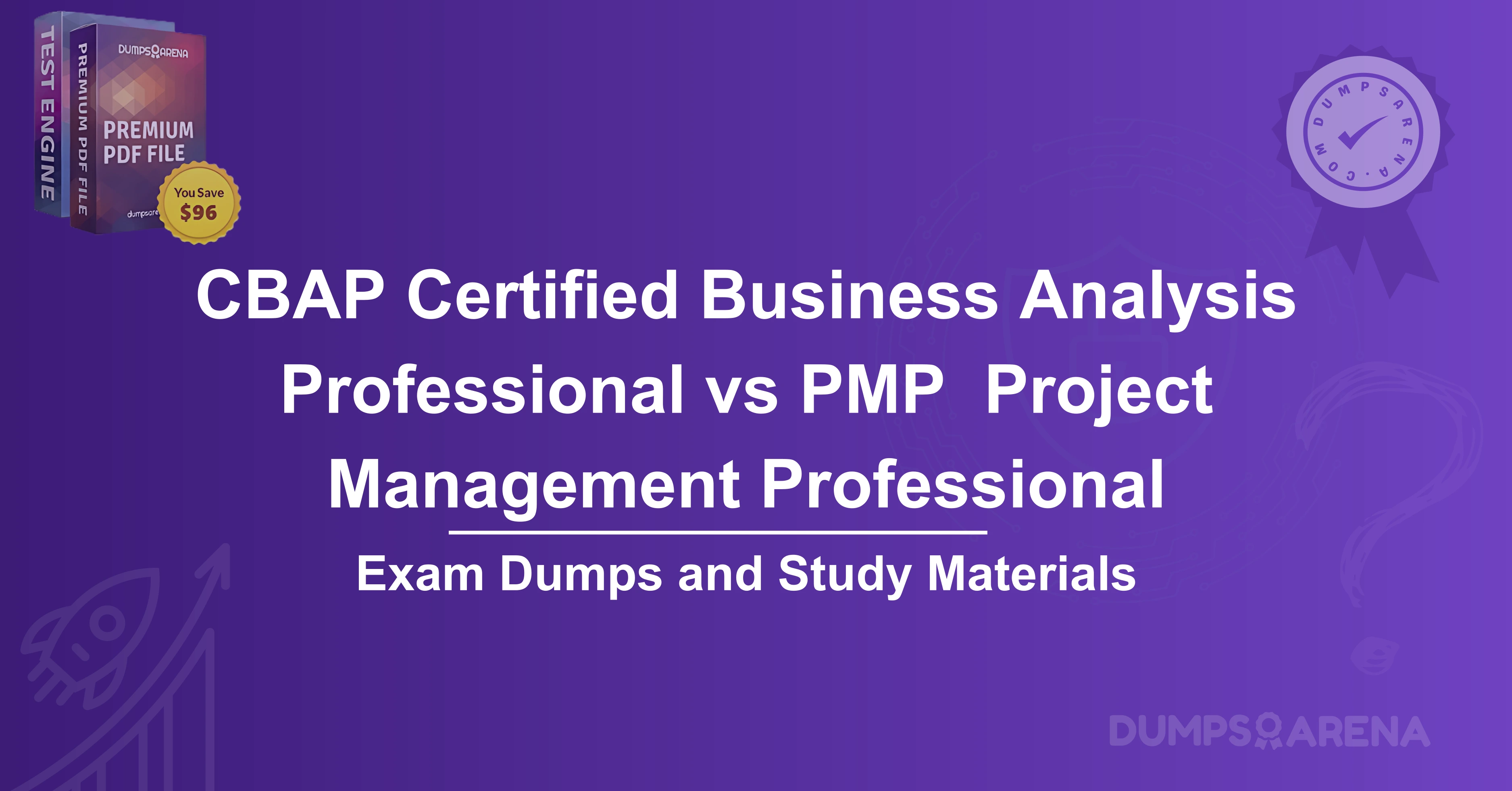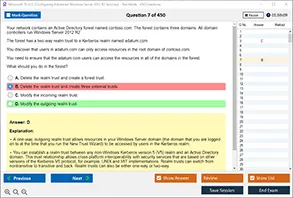CBAP (Certified Business Analysis Professional) vs. PMP (Project Management Professional): A Comprehensive Comparison
Introduction
In today’s competitive business environment, professionals seek certifications to validate their expertise and enhance career growth. Two of the most sought-after certifications in the project and business analysis domains are:
- CBAP (Certified Business Analysis Professional) – Offered by the International Institute of Business Analysis (IIBA)
- PMP (Project Management Professional) – Offered by the Project Management Institute (PMI)
Both certifications are globally recognized and demonstrate a professional’s competence in their respective fields. However, they cater to different roles—business analysis vs. project management.
Overview of CBAP and PMP
What is CBAP?
The Certified Business Analysis Professional (CBAP) is designed for senior business analysts with extensive experience. It validates expertise in:
- Business analysis planning & monitoring
- Requirements lifecycle management
- Strategy analysis
- Solution evaluation
Key Features of CBAP:
- Focuses on business processes, stakeholder engagement, and solution assessment
- Aligns with BABOK® Guide (Business Analysis Body of Knowledge)
- Ideal for professionals in consulting, enterprise analysis, and business process improvement
What is PMP?
The Project Management Professional (PMP) is the gold standard for project managers. It validates skills in:
- Project initiation, planning, execution, monitoring, and closing
- Agile, hybrid, and predictive project management approaches
- Risk management, stakeholder communication, and quality control
Key Features of PMP:
- Based on PMBOK® Guide (Project Management Body of Knowledge)
- Covers predictive (waterfall), agile, and hybrid methodologies
- Highly valued in IT, construction, healthcare, and finance industries
Eligibility Criteria
CBAP Eligibility Requirements
- 7,500 hours (5 years) of business analysis work experience (within the last 10 years)
- 900 hours in at least 4 of the 6 BABOK® Guide knowledge areas
- 35 hours of Professional Development (PD) training
- Two professional references
PMP Eligibility Requirements
- Option 1:
- 4-Year Degree + 36 months of project management experience
- 35 hours of project management education
- Option 2:
- High School Diploma + 60 months of project management experience
- 35 hours of project management education
Note: Both certifications require passing a rigorous exam.
Exam Structure & Difficulty
CBAP Exam Details
- Format: Computer-based testing (CBT)
- Duration: 3.5 hours
- Questions: 120 multiple-choice (case study-based)
- Passing Score: Not publicly disclosed (IIBA uses a scaled scoring system)
- Cost:
- IIBA Member: $325
- Non-Member: $450
Exam Difficulty:
- Focuses on real-world business analysis scenarios
- Requires deep understanding of BABOK® Guide
PMP Exam Details
- Format: Computer-based testing (CBT) or Online proctored
- Duration: 230 minutes
- Questions: 180 (including 5 unscored pretest questions)
- Question Types: Multiple-choice, multiple responses, matching, hotspot, fill-in-the-blank
- Passing Score: Above Target / Target / Below Target / Needs Improvement (No fixed percentage)
- Cost:
- PMI Member: $405
- Non-Member: $555
Exam Difficulty:
- Covers predictive, agile, and hybrid project management
- Requires strong situational judgment
Career Scope & Salary Potential
CBAP Career Opportunities
- Senior Business Analyst ($85,000 – $120,000)
- Business Analysis Consultant ($90,000 – $130,000)
- Product Manager ($100,000 – $150,000)
- Enterprise Analyst ($95,000 – $140,000)
Industries Hiring CBAP Professionals:
- IT & Software Development
- Banking & Finance
- Healthcare
- Consulting
PMP Career Opportunities
- Project Manager ($90,000 – $140,000)
- Program Manager ($110,000 – $160,000)
- Portfolio Manager ($120,000 – $180,000)
- Agile Coach ($100,000 – $150,000)
Industries Hiring PMP Professionals:
- Construction & Engineering
- IT & Telecommunications
- Healthcare
- Government & Defense
Salary Note: PMP-certified professionals tend to earn 20% higher salaries than non-certified peers.
Which Certification is Right for You?
Choose CBAP If You:
Work in business analysis, requirements management, or process improvement
Want to specialize in BABOK® Guide methodologies
Aim for roles like Business Analyst, Product Owner, or Enterprise Architect
Choose PMP If You:
Lead projects and manage teams
Work in Agile, Waterfall, or Hybrid environments
Target roles like Project Manager, Scrum Master, or Program Director
How Can DumpsArena Help You Pass CBAP or PMP?
Preparing for CBAP or PMP requires high-quality study materials, practice tests, and expert guidance.
Why Use DumpsArena?
Latest Exam Dumps – Updated with recent exam patterns
Real Exam Simulation – Practice with scenario-based questions
Detailed Explanations – Understand correct and incorrect answers
High Passing Rate – Trusted by thousands of successful candidates
DumpsArena Features:
CBAP Practice Tests (BABOK® v3 aligned)
PMP Exam Simulator (PMBOK® 7th Edition & Agile)
Instant Download Access
Money-Back Guarantee
Visit DumpsArena Today:
Conclusion
Both CBAP and PMP are prestigious certifications that enhance career prospects.
- CBAP is ideal for business analysts seeking leadership roles.
- PMP is best for project managers aiming for higher responsibilities.
DumpsArena provides authentic exam dumps, practice tests, and study guides to help you pass CBAP or PMP on your first attempt.
Start your certification journey today with DumpsArena!
CBAP Certified Business Analysis Professional vs PMP Project Management Professional Sample Questions and Answers
1. What is the primary focus of the CBAP certification?
A) Managing project timelines and budgets
B) Leading teams in agile environments
C) Advanced business analysis and requirements management
D) Risk management and quality control
2. Which certification is more aligned with the Project Management Institute (PMI) and the PMBOK® Guide?
A) CBAP
B) PMP
C) Both are equally aligned
D) Neither
3. What is a key eligibility requirement for the PMP certification?
A) 7,500 hours of business analysis experience
B) 35 hours of project management education
C) A master’s degree in business administration
D) 5 years of executive leadership experience
4. Which certification requires a minimum of 7,500 hours of business analysis experience for the highest eligibility tier?
A) PMP
B) CBAP
C) Both require the same hours
D) Neither
5. The PMP exam heavily emphasizes knowledge of:
A) BABOK® Guide
B) Agile methodologies only
C) PMBOK® Guide and process groups
D) Six Sigma principles
6. Which certification is more suitable for professionals focused on defining business needs and solutions?
A) PMP
B) CBAP
C) Both equally
D) Neither
7. How many knowledge areas does the BABOK® Guide (used for CBAP) define?
A) 5
B) 6
C) 10
D) 12
8. Which certification exam includes questions on stakeholder management but from a project execution perspective?
A) CBAP
B) PMP
C) Both
D) Neither
9. For someone transitioning from business analysis to project management, which certification would be more beneficial?
A) CBAP
B) PMP
C) Both are equally beneficial
D) Neither
10. Which of the following is a key difference between CBAP and PMP?
A) CBAP focuses on project execution, while PMP focuses on business strategy
B) CBAP is for business analysts, while PMP is for project managers
C) PMP requires less professional experience than CBAP
D) Only PMP is recognized globally
These questions highlight the key differences in focus, eligibility, exam content, and career applicability between CBAP and PMP. Let me know if you'd like explanations or additional questions!



